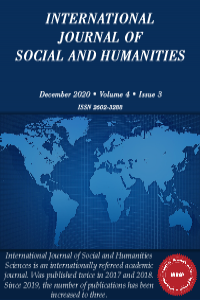ON THE IMPORTANCE OF WOMEN IN OSMANLI PERIOD
Abstract
In the Ottoman Empire, women's place in society is restricted for many traditio-nal and religious reasons. This attitude continued until the Tanzimat era, and the understanding of equality brought about by the Tanzimat era was also reflected in the inequality between men and women.the decanation of the Tanzimat period was also reflected in the inequality between men and women. The previous posi-tion was maintained in practice, even if equality was achieved on paper in the Tanzimat era. The definition of legal norms in the Ottoman Empire by Islamic sources also had an impact on women's rights. In addition, due to the fact that the Turks were of Central Asian origin, Turkish culture in pre-Islamic times led to restrictions on women's rights in the Ottoman period. The influence of Sharia provisions in the Ottoman Empire with a theocratic and monarchical regime pushed women into domestic life. With regard to inheritance in the Ottoman Empire, it was noted that women had a smaller share of inheritance than men. In the Ottoman courts, 2 women were equated to only one man, and there was no difference in religious education between girls and boys, and girls were educated in sibyan schools. Women in the village, like men, managed their homes by working in the fields and weaving carpets and rugs, but never had equal rights with men. 16. in a century when prefectural stores in job allowed women to meet or date men, religious teachers interpreted this situation as "the Apocalypse is coming" and " religion is getting out of control." İn 1573, women were banned from entering slider stores after filing complaints. a store owner who took fema-le customers to their store would be fined. 18. The third century is known for its negative approach to women. Osman wore clogs or shoes with large blisters when he did not want to meet women in the harem. Women also stopped to av-oid meeting him. III, which banned women from going out in a bizarre way. Osman ordered them to dress simply. III. Osman also banned women from go-ing outside in Istanbul for three days of the week, which he dedicated to his trips. On other days, women who went out on the street had to dress in a veiled and simple way. Women going out on the street don't match this. On Osman's orders, they were thrown into the sea and killed.
References
- Vikipedi (https://tr.wikipedia.org/wiki/Osmanl%C4%B1_%C4%B0mparator lu%C4%9Fu%27nda_kad%C4%B1n%C4%B1n_toplumdaki_yeri) Osman’lı devletinde kadının statüsü eğitimi ve çalışma hayatı isimli makale (Sibel Dulum)
- Sabah Gazetesi haber yazısı (https://www.sabah.com.tr/yasam/2016/03/07/osmanlida-kadin-bastaciydi)
- F.Köprülü, İslam ve Türk Hukuk Tarihi Araştırmaları ve Vakıf Müessesesi, İstanbul 1982
- İslamiyet’in Manevi ve Kültürel Değerleri, çev. Bahadır Dülger, Ankara, 1963
- K. Ziya – M. Şeker, İslam – Türk Medeniyeti Tarihi, İstanbul, 1982
- S. Dulum, Osmanlı Devleti’nde Kadının Statüsü, Eğitimi ve Çalışma Hayatı, Eskişehir,2006
- T. Oktar, Osmanlı Toplumunda Kadının Çalışma Yaşamı, İstanbul, 1998
OSMANLI DÖNEMİNDE KADININ YERİ ÜZERİNE
Abstract
Osmanlı İmparatorluğu'nda kadının toplumdaki yeri geleneksel ve dinsel birçok nedenden dolayı kısıtlıdır. Bu tutum Tanzimat Dönemi'ne kadar devam etmiş olup Tanzimat döneminin getirdiği eşitlik anlayışı kadın ile erkek arasındaki eşitsizliklere de yansımıştır. Tanzimat döneminde kâğıt üzerinde eşitlik sağlansa bile uygulamada önceki tutum devam etmiştir.
Osmanlı'da hukuk kurallarının İslami kaynaklarca belirlenmesi kadın hakları üzerinde de etkisini göstermiştir. Ayrıca Türklerin Orta Asya kökenli olmasından dolayı İslamiyet öncesi dönemlerdeki Türk kültürü, Osmanlı döneminde kadınların sahip oldukları hakların kısıtlı olmasına neden olmuş-tur. Teokratik ve monarşik rejimli Osmanlı İmparatorluğu'nda şeriat hükümlerinin etkili olması kadınları ev yaşamına itmiştir. Osmanlı'da miras konusunda da kadınların erkeklere oranla daha az miras payına sahip olduğu gözlenmiştir. Osmanlı Mahkemelerinde 2 kadın ancak bir erkeğe denk tutulmuş, dini eğitimde ise kız-erkek ayrımı yapılmayıp kız çocukları sıbyan mekteplerinde eğitim görmüşlerdir. Köydeki kadınlar ise erkekler gibi tarlalarda çalışarak evini yönetip, halı ve kilim dokumasına karşın asla erkekler ile eşit haklara sahip olmamışlardır.
Keywords
References
- Vikipedi (https://tr.wikipedia.org/wiki/Osmanl%C4%B1_%C4%B0mparator lu%C4%9Fu%27nda_kad%C4%B1n%C4%B1n_toplumdaki_yeri) Osman’lı devletinde kadının statüsü eğitimi ve çalışma hayatı isimli makale (Sibel Dulum)
- Sabah Gazetesi haber yazısı (https://www.sabah.com.tr/yasam/2016/03/07/osmanlida-kadin-bastaciydi)
- F.Köprülü, İslam ve Türk Hukuk Tarihi Araştırmaları ve Vakıf Müessesesi, İstanbul 1982
- İslamiyet’in Manevi ve Kültürel Değerleri, çev. Bahadır Dülger, Ankara, 1963
- K. Ziya – M. Şeker, İslam – Türk Medeniyeti Tarihi, İstanbul, 1982
- S. Dulum, Osmanlı Devleti’nde Kadının Statüsü, Eğitimi ve Çalışma Hayatı, Eskişehir,2006
- T. Oktar, Osmanlı Toplumunda Kadının Çalışma Yaşamı, İstanbul, 1998
Details
| Primary Language | Turkish |
|---|---|
| Journal Section | Research Article |
| Authors | |
| Publication Date | December 31, 2020 |
| Published in Issue | Year 2020 Volume: 4 Issue: 3 |

